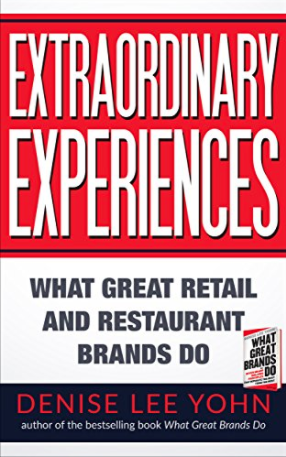Extraordinary Experiences by Denise Lee Yeon
The Big Idea: creating extraordinary customer experiences is an essential part of building a great brand.
Intro.
- Brands matter more than ever.
- The internet has increased transparency, so now brands need to be more authentic than ever.
- Image manipulation through marketing muscle is not enough.
- Great restaurant and retail brands rely heavily on great customer experiences and are worth studying.
- Benefits of a strong brand: higher profit margins, customer loyalty, lower overhead costs, greater market valuations, and good will for when things go wrong.
1. Great Brands Start Inside: Popeye’s Louisiana Kitchen
- Prioritizing the needs of franchise owners (not shareholders, customers, or employees) resulted in a dramatic turnaround for Popeye’s.
- The change in priority led to more training, better communication, improved culture, motivated front-line employees, and improved customer experience.
- A strong company culture is a competitive advantage.
2. Great Brands Avoid Selling Products: H-E-B
- Selling food can be a commodity business, but HEB has managed to differentiate itself from Walmart and others by designing a stellar customer experience that is about more than commodity groceries.
- Examples: longer sampling hours, a greater variety of wines, attractive displays, demonstration kitchens, in-store restaurants, take-out bbq.
- HEB also makes Texas part of its identity. People tend to do business with people like them.
- HEB knows their customers better because they are local.
- HEB’s charitable giving “Helping Here” also supports the local branding and commitment to the community to be more than a place to buy groceries.
3. Great Brands Ignore Trends: Buffalo Wild Wings
- While other casual restaurants lowered prices during the Great Recession, Buffalo Wild Wings reinforced its positioning as the ultimate sports bar by increasing service, improving the experience, and highlighting its unique personality.
- The result was a better customer experience, more customer loyalty, lower employee turnover, stronger differentiation, and increased market share.
- Most companies don’t pioneer, they follow the leader. They will always be behind.
4. Great Brands Don’t Chase Customers: Costco
- Costco succeeded by stating, “this is who we are, these are the customers we care about” and then doing everything they can to meet those customers’ needs.
- Costco’s $55 membership fee weeds out low-income customers and selects for higher-income customers who want higher-quality goods but still want a bargain.
- In return for lower prices on higher-quality goods, customers make a commitment to shop there regularly by paying a membership fee.
- Costco is able to earn customer loyalty with better customer service enabled by paying employees well.
- It’s okay to alienate some customers to serve other customers better. You can’t be everything to everybody.
- A mass, undifferentiated marketing strategy might produce big gains in the short-term but won’t differentiate the brand or attract/retain customers in the long-term.
5. Great Brands Sweat the Small Stuff: PIRCH
- PIRCH is a luxury appliance retailer with eight showrooms.
- PIRCH differentiates itself by playing attention to every detail.
- Examples: a barista greets you at the front door then asks you if you would like a tour or prefer to wander, free samples of food as you shop, cooking demonstrations, working showers, thoughful design of the company headquarters.
- “Retail is detail.”
- Note: company may or may not be profitable yet.
6. Great Brands Commit and Stay Committed: Jason’s Deli
- Privately held company with more than 240 locations. Based in Beaumont, TX for over 40 years (I see a pattern).
- Prices were always low, but portions are always generous and food quality is high.
- They decided against breakfast even though it would increase sales short-term because it would affect lunch and catering long-term.
- Basecamp mandates a 4-day workweek in the summer because balance is part of its culture.
- In-N-Out pays front-line employees generously because they understand that they drive the customer experience and drive the business.
- Jason’s Deli prefers to stay private because their culture would not be a good fit with Wall Street
- They discovered their own values. They didn’t hire a company to decide them.
- Instead of chasing growth, they grow when feel they are ready to grow.
7. Great Brands Never Have to ‘Give Back’: sweetleaf
- sweetleaf is a restaurant chain focused on local food and environmental friendliness.
- By being authentic to its values, sweetleaf attracts customers who share those values.
- Great brands who choose to pursue social impact – do it as a core element, not as a bolt-on program for good publicity.
Summary
- Be different and memorable.
- Branding is not taglines, promotions, logos, or advertising.
- Branding is expression of the company’s values, mission, and personality.
- Short-term success may come at the expense of long-term success.
- Brand-building can’t be delegated to the marketing department or an advertising agency. It starts from leadership and company culture.
